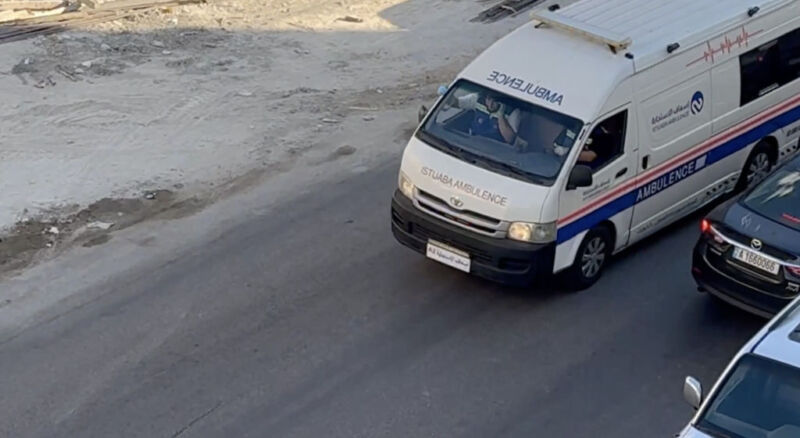Pagers —
Lithium-ion batteries or supply chain attack may be to blame.

Enlarge / An ambulance arrives at the site after wireless communication devices known as pagers exploded in Sidon, Lebanon, on September 17, 2024.
A massive wave of pager explosions across Lebanon and Syria around 3:30 pm local time today has killed at least eight people and injured more than 2,700, according to local officials. Many of the injured appear to be Hezbollah members, although a young girl is said to be among the dead.
New York Times reporters captured the chaos of the striking scene in two anecdotes:
Ahmad Ayoud, a butcher from the Basta neighborhood in Beirut, said he was in his shop when he heard explosions. Then he saw a man in his 20s fall off a motorbike. He appeared to be bleeding. “We all thought he got wounded from random shooting,” Ayoud said. “Then a few minutes later we started hearing of other cases. All were carrying pagers.”
...
Residents of Beirut’s southern suburbs, where many of the explosions took place, reported seeing smoke coming from people’s pockets followed by a blast like a firework. Mohammed Awada, 52, was driving alongside one of the victims. “My son went crazy and started to scream when he saw the man’s hand flying away from him,” he said.
Video from the region already shows a device exploding in a supermarket checkout line, and pictures show numerous young men lying on the ground with large, bloody wounds on their upper legs and thighs.
The shocking—and novel—attack appears to have relied on a wave of recently imported Hezbollah pagers, according to reporting in The Wall Street Journal. (The group has already warned its members to avoid using cell phones due to both tracking and assassination concerns.)
According to the WSJ, a Hezbollah official speculated that "malware may have caused the devices to explode. The official said some people felt the pagers heat up and disposed of them before they burst."
The pagers in question allegedly have lithium-ion batteries, which sometimes explode after generating significant heat. The coordinated nature of the attack suggests that some kind of firmware hack or supply chain attack may have given an adversary the ability to trigger a pager explosion at the time of its choosing.
Hezbollah officials are already privately blaming Israel, which has not taken responsibility, but it has been able to perform surprising electronic strikes on its enemies, including the Stuxnet malware that damaged Iran's nuclear program.
The Associated Press noted that even Iran's ambassador to Lebanon was injured in the widespread attack.
Update, 12:55pm: The Times adds a small detail: "The devices were programmed to beep for several seconds before exploding, according to the officials, who spoke on the condition of anonymity because of the sensitivity of the matter."
Several of the explosions were captured on video, and in them, the devices appear to "explode" more in the manner of a small grenade (a bang and a puff of smoke) than a lithium ion battery (which may explode but is often followed by continuing smoke and fire), despite some of the early speculation by Hezbollah officials. This is a breaking story, and the cause of the explosions still remains unclear.
Update, 1:05pm: The WSJ quotes regional security analyst Michael Horowitz as suggesting the attack was likely caused by either 1) malware triggering the batteries to overheat/explode or 2) an actual explosive charge inserted in the devices at some point in the supply chain and then detonated remotely.
“Either way, this is a very sophisticated attack,” Horowitz told the WSJ. “Particularly if this is a physical breach, as this would mean Israel has access to the producer of those devices. This may be part of the message being sent here.”
Update, 1:20pm: Reuters notes that Israel has claimed to foil a Hezbollah assassination plot that would have used remotely detonated explosives.
Earlier on Tuesday, Israel's domestic security agency said it had foiled a plot by Lebanese militant group Hezbollah to assassinate a former senior defence official in the coming days.
The Shin Bet agency, which did not name the official, said in a statement it had seized an explosive device attached to a remote detonation system, using a mobile phone and a camera that Hezbollah had planned to operate from Lebanon.